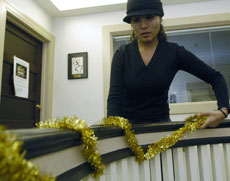Groups put cultural fee to work

Online Poster
November 30, 2004
Four separate committees are working to distribute revenue from the Student Cultural Programming fee, which collected money for the first time this semester to promote cultural awareness on campus. However, some are dissatisfied with the way the money is being distributed.
To receive funding, University faculty, staff and students must fill out a request explaining why the Student Cultural Programming fee should fund their project. The projects must promote cultural awareness in some way, according to funding guidelines. The proposal then must pass through a subcommittee comprised of six students and one or two members of the faculty.
According to Cathy Acevedo, associate dean of students, some feared the money would be affected by state budget cuts if it were given directly to the cultural houses, so instead a system of committees was established to distribute funds.
Each of the four cultural houses has its own committee of 12 people with an accompanying subcommittee. Faculty or staff members of the subcommittee vote only in the case of a tie. If the subcommittee approves the proposal, the full committee of six students and five faculty and staff members must approve it. It then must pass through the dean of students, William Riley, for final approval.
But Giraldo Rosales, director of La Casa Cultural Latina, said that the cultural houses have had the same budget since 1992 and wouldn’t be affected by budget cuts.
Get The Daily Illini in your inbox!
“Not having additional money prevents us from growing,” Rosales said. “Our budget hasn’t gone down ever. We never got the gravy, now no one has it.”
Giraldo Rosales said another problem with the distribution of money is that the application process takes too long. Board members from each of the University’s cultural programs meet once a month, meaning some October events did not receive funding until November.
“Most performers like to get their money that day,” Rosales said. “Students have to up front the money, (that creates) a problem. Most don’t have the money to put up in advance.”
Students pay the fee – which costs two dollars – to promote African American, Native American, Latino/Latina and Asian American cultural programs across campus. Rosales said he has heard complaints from students who believe the money is not easily accessible.
“Students complain that students on the board have bones to pick with certain organizations,” Rosales said.
However, senior in business Michael Harden said he did not have problems with the application process or the interviews with board members when he was seeking funds to have Minister Louis Farrakhan speak on campus.
“Cathy Acevedo was very helpful,” Harden said. “The whole process was pretty self-explanatory.”
In Rosales’ opinion, the board members hold too much power on deciding what cultural events to fund.
“You don’t trust the director who gets paid to make cultural decisions,” asked Rosales, referring to his lack of involvement in the funding distribution.
However, not all directors feel the way Rosales does. Nathaniel Banks, director of the African-American House, said he believes the committees are allocating cultural money well.
“That’s the way it should be, it’s the student’s dollars,” Banks said. “It wasn’t set up for me.”
However, Banks does see a problem with the perception that the fees are only available to minority students.
“I am uncomfortable with the idea that some students might view the cultural fees as the ‘minority student organization resource fee,'” Banks said. “The fees are designed to be much broader than that.”
Acevedo said students have the option of requesting a reimbursement for the two-dollar fee. Money rolls over each semester if not used.
Rosales believes that, in the end, the fee will be a benefit to many students.
“I’m trying to fix what isn’t, rather than what is,” Rosales said. “Once students get the hang of it, things will be fine.”






